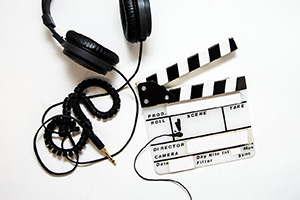Jack Carrivick talks about the art of comedy directing
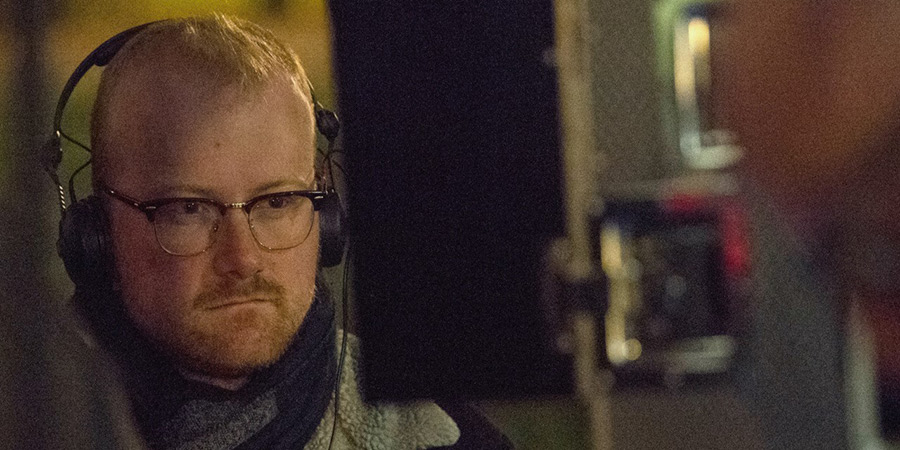
As a couple of his projects arrive on screens, we thought it a good time to talk to director Jack Carrivick.
Hi Jack. How did you first get involved in comedy?
So, my first ever job in comedy was on French And Saunders in 1995 (I was five), I played one of the children in a sketch about mothers. I had the flu and had to keep on going off set to throw up. Fast forward to when I was fifteen, I did some work experience at a post production house in Soho called Suite where I ended up working full time when I turned 18, as at that time my goal was to be a comedy editor.
Since then, what have been the biggest things you've learned?
It's helped me a lot that I have worked as crew in both post production and in the camera department. Understanding the technical behind the artistry and craft is a major part of my skill set.
By being on set for the past fifteen years, you do learn a lot, not only about the craft but also how a good set should be run.
I do watch a lot of films and TV, and then normally research the project after; find out the budget, how did it get made, what cameras and lenses were used, that sort of thing.
I've been really lucky in the fact that I've worked with some fantastic comedy actors over the years. Every time you come away learning just a little bit more about the craft.
You directed Seen, the Sky comedy short written by and starring Jordan Brookes, which has just been released. Tell us more about that project...
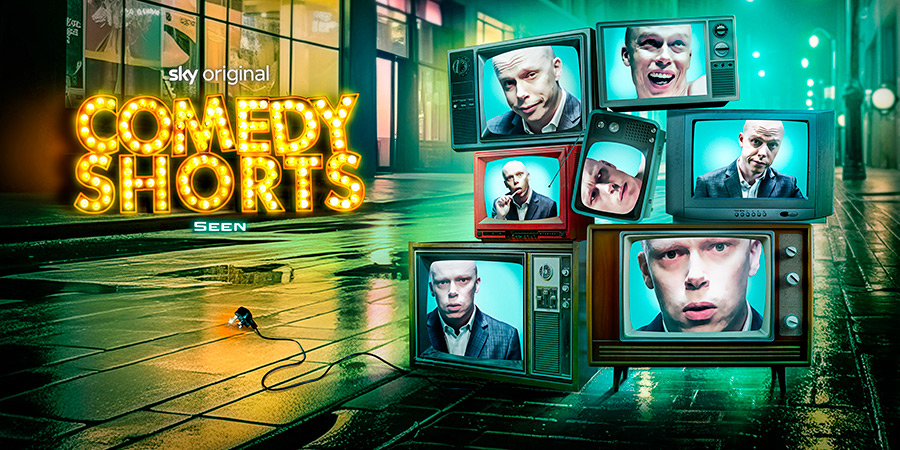
I've been a fan of physical comedy for quite a while, people like Marny Godden and Spencer Jones have always been fringe favourites for me. Jordan had just won the Edinburgh Comedy Award and I had been a fan of his stuff for a while, so when the opportunity arose to be involved with Jordan's Sky Short I jumped at the chance. Michelle Farr-Scott at Ranga Bee very kindly invited me in for an interview and the rest is history.
Seen lends itself to physical comedy of the silent era, in that same way that Mr Bean previously did. We've tried to not only build upon that but also take it a step further. Modern day anxieties and technology play a big part in Seen and I think we have managed to capture a moment of what it's like when you are alone in the modern day. I think it's quite a relatable piece.
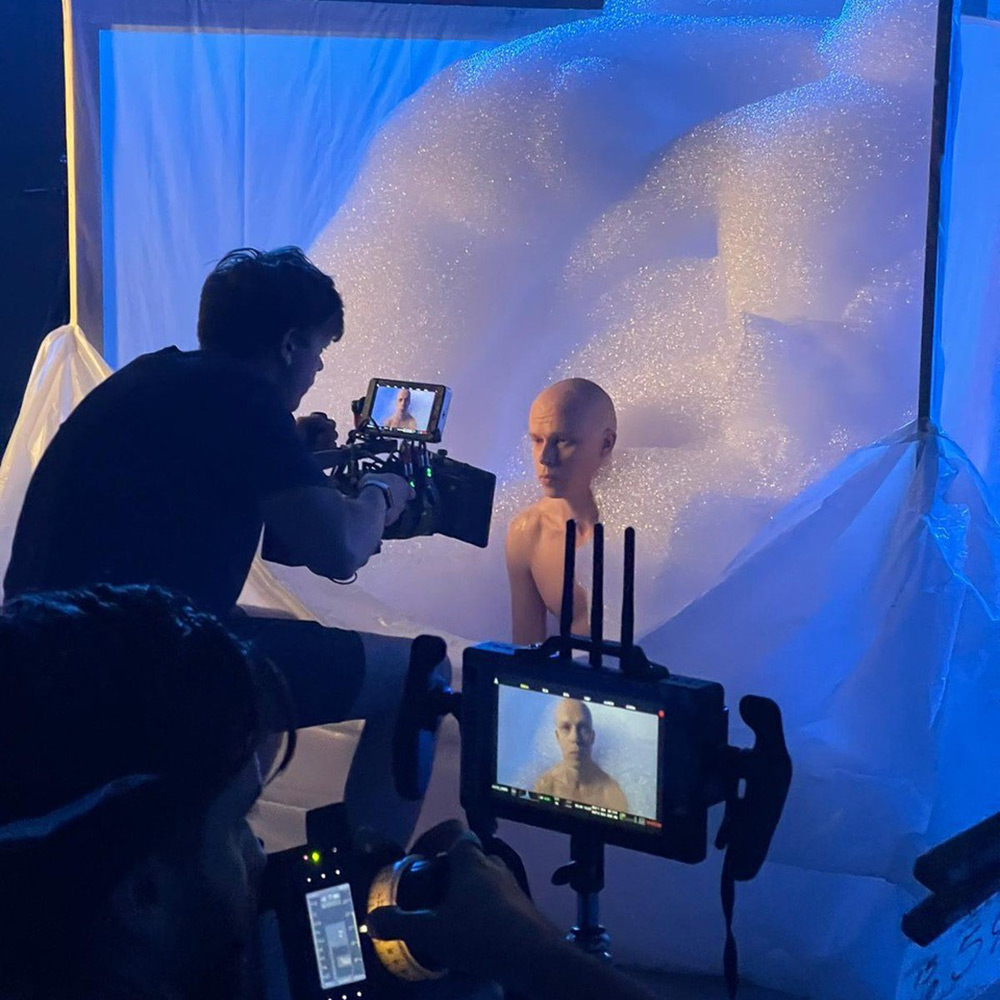
My personal nod to the silent era is the use of the 4:3 framing in the bathroom. I have a theory that the 4:3 (1.33:1) aspect ratio is a better shot size for comedy. Giving Jordan a solid frame to play within was key to this project, he's very funny, I didn't want to interrupt his flow with unnecessary editing.
What was the most challenging thing involved in making the short?
We had very limited resources. Everyone will always complain about budget, but when we shot Seen last year the industry was very busy. Finding studio space, set builders and crew were all huge tasks. We were very lucky that we had some fantastic HODs [heads of department]; creative solutions were constantly coming in all directions. We couldn't have done it without each other.
Can you tell us more about the specifics of filming it? The set plays an important part...
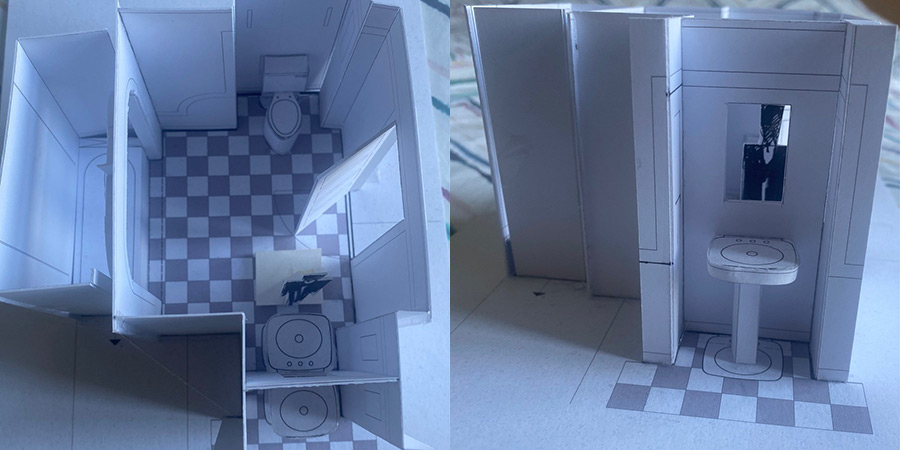
Set builds are expensive. You not only have to build the set, but you have to put it in a studio too. The set nearly didn't happen at one moment. From memory I don't think we could find a studio at all. Our designer Harry Banks told me on the phone that his previous job had the same issue and they had no choice but to put the set in a barn. Then, I think the same day, our location manager Mike Glynn informs me that he had just been scouting for one of the other Sky Shorts and he found an empty grain store in Essex. We recced it; it was perfect... and that is where we shot Seen.
We put two trap doors on the set, behind the toilet and two sides of the bath. These weren't only essential for us to do the transition from the bathroom to 'The Void', but I also wanted them in there as camera traps. You had so little space in that set, the camera traps just let us get round the other side without cheating positions.
I stole the mirror trick from La Haine. So you shoot from outside the set, use a body double to pretend to be the back of Jordan's head and then have Jordan inside the set. By that opening shot starting off as an "Over the shoulder" and then developing into a POV, we start the short off by taking the audience literally into Jordan's head. That opening shot is 50 seconds which is quite long in comedy but it doesn't feel like it, you're totally with Jordan for that whole shot, it's great.
I do love that set. Harry did a great job building it and Rik Burnell our DOP did a great job of lighting it. It's also a nod to my favourite film.
Moving on to a different project: You've just released your new short online...
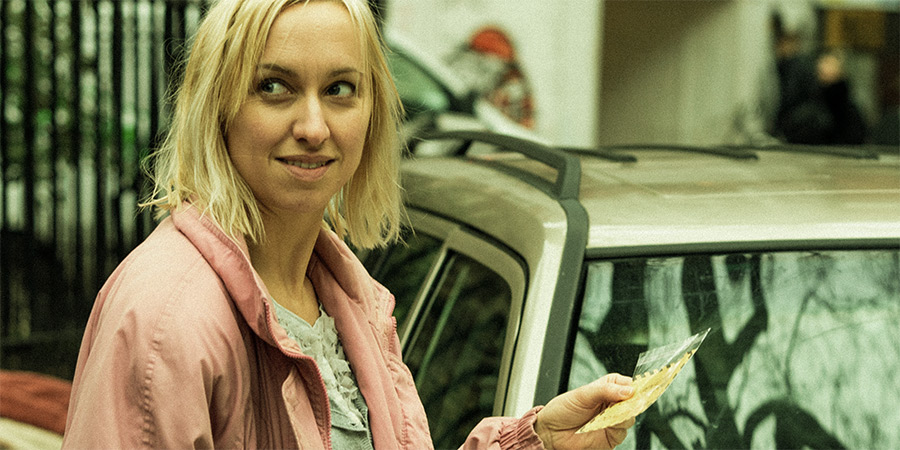
How do I introduce How to Disappear? It's a satire about delusional narcissism starring the very funny Kerry Howard. It's about Nina, a hermit who wants to totally withdraw from life. She comes up with a way to totally disappear but after an incident, she gets a taste for blood. Her invisibility allows her to carry out these violent activities without being noticed. It's funny, it's silly and it's very very violent.
Can you tell us more about how it was made?
We made it in January 2020 (before the event). It was a 4 day shoot which was self-funded. I think it cost me 6k in total (including the festival run).
We had two days at a farm and woods, then one day in Dalston to shoot at my house, Vortex Jazz club and the streets around it. Then the final day was around Soho, and we finished up in Bar Italia.
Beg, borrow, steal (not really any stealing) is how we got this one done with the little money we had. Very kindly One Stop Films let us have the kit for a token fee. Ed Smith at Liteworx is a very old mate of mine and he gave us the lights and a spark. Lot of people's kindness and charity let us make this film. Also the crew worked for free, I have been very lucky.
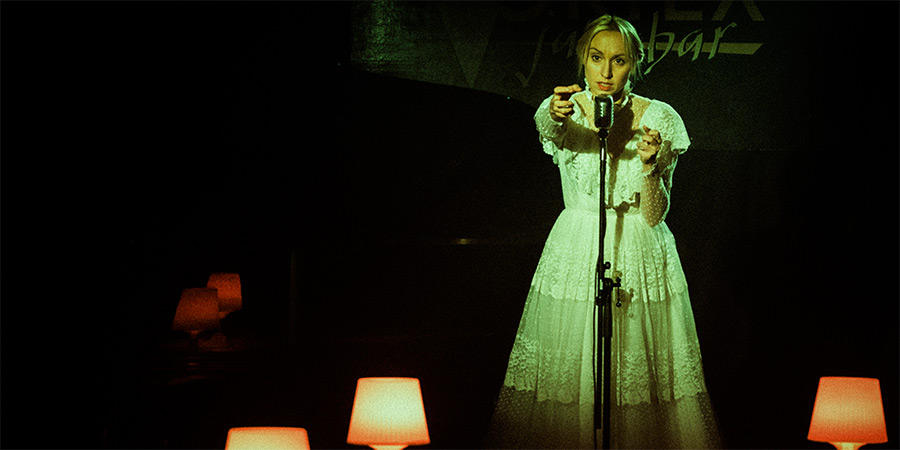
It sounds like a lot of planning was required...
HTD was bit of a beast. When we finally shot, it that was my third attempt and I had referred to the project as cursed. The previous year we had to pull the shoot three days before filming. My producer on HTD, Iggy Ellis, is a very experienced location manager so in terms of getting into good locations, that was all his doing.
Even though HTD looks like a lot (30 scenes in total I think), lots of those scenes just play out on one shot. Probably six months before filming I already had my short list drafted up, so when I edited the script I could also tweak the shortlist.
When you have no money, you need to spend more time on things like prep. It just means on the day you can get through a hefty scene count, you don't have the luxury of just finding it on the day.
Working with people like Matt Wicks (DOP), a friend for over ten years, chatting over style and techniques is a joy, there is a mutual respect and that makes long production meetings fly by.
Ashley-Ann Andrews, our costume designer, was essential in helping not only develop the look for Nina but helped me build the character. Ashely and I sat in my local pub having lunch, about 18 months before we finally filmed the short, and we talked through the character in so much detail. I left that pub knowing so much more about my own character. Ashely was essential to that character development.
It has had success at film festivals around the world. What are the motivations for keeping it offline in that period, as you enter it into festivals?
Festivals let your film get seen the way you want it to be seen. On a big screen, with other people, on a proper sound system. The goal is always to end up at a BAFTA or Academy affiliated festival, lots of industry eyes on your work and great networking opportunities. You spend so much time, love and effort making something it's sad to see it get lost. Lots of people forget to spend the same amount of time and effort in the distribution; festivals are a great way to keep your work alive for a bit longer.
The reason you need to keep your film offline whilst it's doing its festival run is purely the request from the festivals. Sometimes the stipulation for getting into a festival is that it's a "Premier". There is a lot of strategy when it comes to that, where to screen first, that kind of thing. I used Festival Formula for HTD's festival strategy. Film festivals are a whole different world and the first few times you do it, it's a good idea to get guidance.
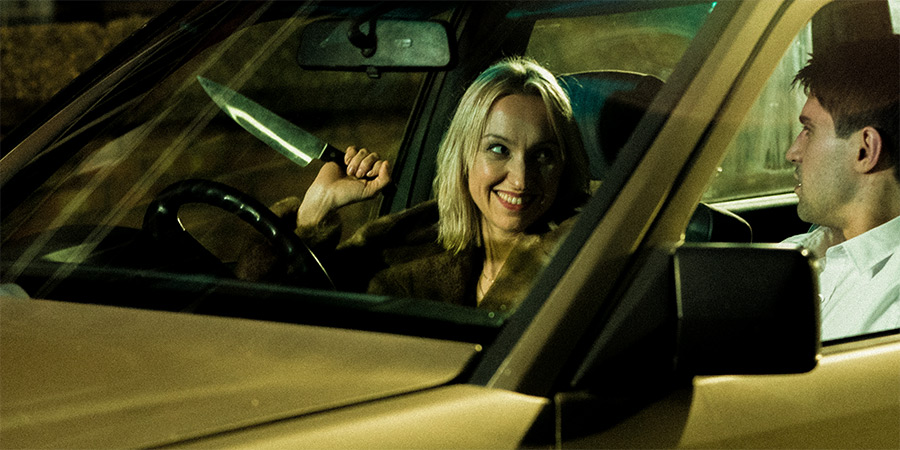
More generally, what advice would you give to someone starting out in directing?
Learn your craft and then take risks. You never learn if you don't put yourself in a position where you are very close to making a mistake.
I have advanced technical knowledge when it comes to cameras and post production. Although all that knowledge isn't essential to directing, it comes in very useful in knowing the limitations of what is possible. Knowing the tools that are available to you is key.
I would also say study the work of well-known directors in the field you want to get into. Not just the obvious greats like Kubrick or Scorsese, their style and tropes are already so well documented and commented on. For example, I'm currently studying Joel Schumacher films where I've just noticed a technique he uses to help set up the environment for his characters. I may borrow it.
What are your next plans?
I've got a few things cooking. Nothing to phone home about yet, but hopefully some news in the next few months.
I'm always looking for a new project, and to meet new writers. In all honesty, I would like to focus more on directing. I will always enjoyed developing my own ideas but it is equally a joy to work on someone else's project and help bring that to life.
I've been meeting writers and performers who I admire over the summer, just trying to make new connections and seeing if anything comes from those chats.
I recently took part in some multicam sitcom training; I'm very keen to keep that art form alive. It's very popular with audiences, I don't know why they don't make more of them!
Also, I think it's a good time to start looking for representation - that is probably the next step for me.
Seen can be, er, seen via Sky on demand (search "Sky Comedy Shorts") or watch via Now TV
This article is provided for free as part of BCG Pro.
Subscribe now for exclusive features, insight, learning materials, opportunities and other tools for the British comedy industry.


